

Order a call
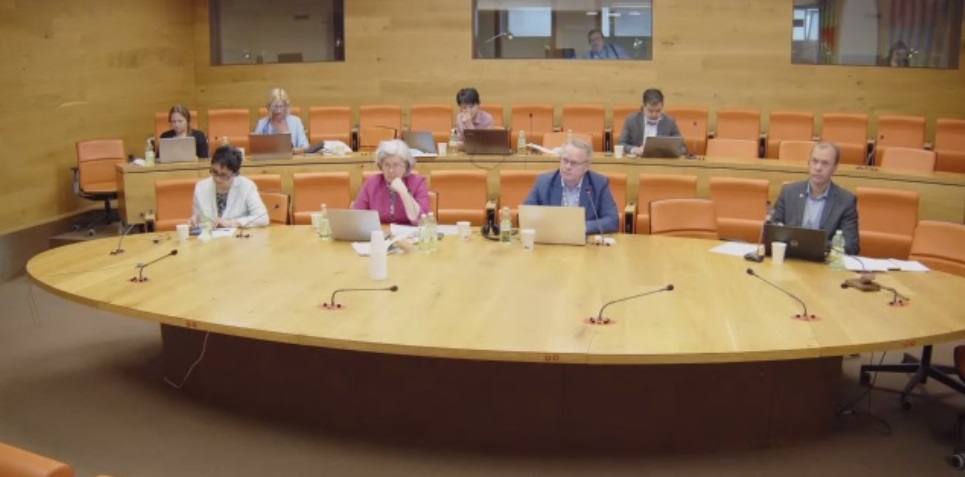
As part of the virtual 32nd session of the FAO/WHO Regional Coordinating Committee for Europe (CCEURO), on May 19, 2022, FAO/WHO Side Event dedicated to the issues of food fraud has been held. This event was conducted as an outcome of the agreements reached at the 31st session of CCEURO in Almaty, on enhancing actions and increasing cooperation across sectors and countries and the important role of the Codeх on this issue.
The presentation was made by Carmen Bullon (Representative of the FAO Legal Unit) on the joint work of FAO and the University of California at Los Angeles to develop regulatory strategies to counter food fraud. The panel discussion was attended by representatives of the Directorate General of Health and Food Safety of the European Commission, the Food and Veterinary Agency of North Macedonia, the Directorate General of Food Control of the Ministry of Agriculture and Forestry of the Republic of Turkey, Laboratory of the Government Chemist (LGC) of United Kingdom. On behalf of the RSE «National Center of Expertise» of the CSEC of the Ministry of Healthcare of the Republic of Kazakhstan, the Director of the Department for Methodological and Metrological Support M.B. Kantarbaeva have been participated.
All participants emphasized the importance and necessity of forecasting, preventing and controlling food fraud. For these purposes, international cooperation, data exchange, identification of gaps and control of food fraud, including with the use of modern information technologies, are of particular importance for these purposes. In combating food fraud, there is a need to develop a concerted approach to improving legislation against fraud, the use of validated methods and standards to detect fraud and to raise consumer awareness.
 On May 16-20, 2022, the 32nd session of the FAO/WHO Coordinating Committee for Europe of the Codex Alimentarius Commission (hereinafter CCEURO’32) was held under the chairmanship of Kazakhstan. For the first time in history of the Commission, the regional Committee was held in a virtual format. The Codex Alimentarius Team of Kazakhstan, as the CCEURO Secretariat, together with the Codex Secretariat, FAO Headquarters, FAO and WHO Regional Offices, worked in Rome, at the office of the Codex Alimentarius Commission. More than 40 observer organizations and some countries from other regions also participated in the session.
On May 16-20, 2022, the 32nd session of the FAO/WHO Coordinating Committee for Europe of the Codex Alimentarius Commission (hereinafter CCEURO’32) was held under the chairmanship of Kazakhstan. For the first time in history of the Commission, the regional Committee was held in a virtual format. The Codex Alimentarius Team of Kazakhstan, as the CCEURO Secretariat, together with the Codex Secretariat, FAO Headquarters, FAO and WHO Regional Offices, worked in Rome, at the office of the Codex Alimentarius Commission. More than 40 observer organizations and some countries from other regions also participated in the session.
Main issues discussed at the session:
CCEURO’32 documents and report can be found here
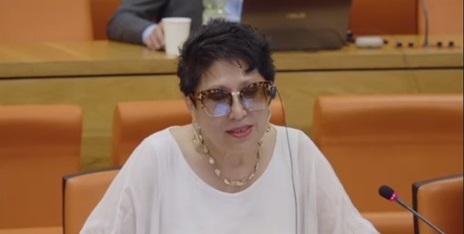
April 1, 2022, a regular meeting of the Interagency Steering Committee on Codex Alimentarius issues was held online.
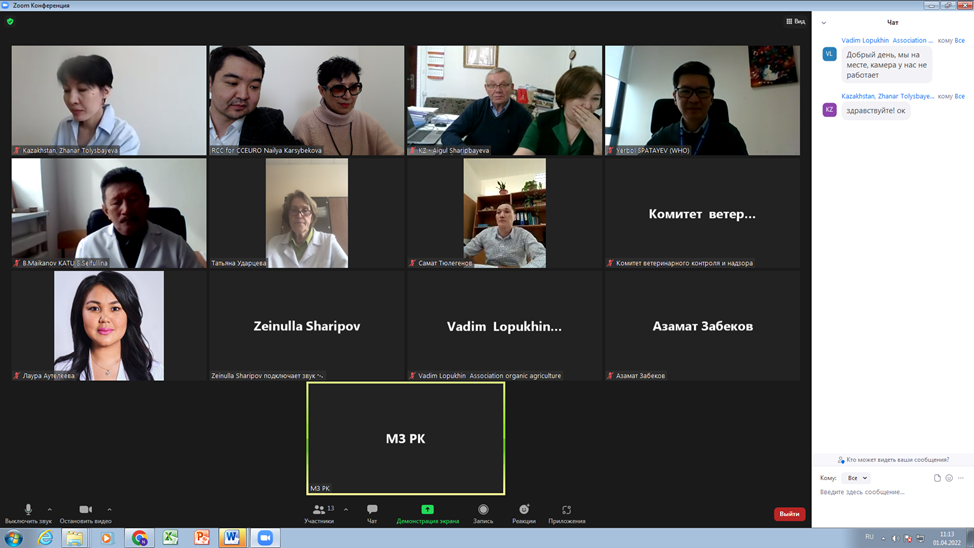 Codex contact point of the Republic of Kazakhstan, an expert on hygiene of nutrition Tolysbayeva Zh. made a report on updating the order “On the Interagency Steering Committee on Codex Alimentarius issues”. The speech reflected the main chapters of the order and noted the changes made in. The information was taken into account by the members of the Steering Committee, whom were sent an electronic version of the order.
Codex contact point of the Republic of Kazakhstan, an expert on hygiene of nutrition Tolysbayeva Zh. made a report on updating the order “On the Interagency Steering Committee on Codex Alimentarius issues”. The speech reflected the main chapters of the order and noted the changes made in. The information was taken into account by the members of the Steering Committee, whom were sent an electronic version of the order.
Coordinator of the Coordinating Committee FAO/WHO for Europe of the Codex Alimentarius Commission (CAC) Karsybekova N. reported on the decisions of the Subcommittee of the Executive Committee of the CAC regarding the Declaration of Principles Concerning the Role of Science. This document is of the utmost importance to all Codex members and will contribute the Codex Committee Chairs to find solutions and compromise at discussing documents.
Professor Karsybekova N. continued information on the preparations for the 32nd session of the Coordinating Committee FAO/WHO for Europe (CCEURO’32), which was scheduled to meet in Berlin and Germany as the co-host. However, due to the changed international situation in the region, the 32nd session will be held virtually. Thus, CCEURO’32 will be chaired by the Republic of Kazakhstan in a virtual format.
Expert in veterinary and phytosanitary Sharipov Z. made a presentation about the mid-term evaluation of the CTF2 Trust Fund project. The Mid-term Evaluation takes place in the middle of the CTF2 Project implementation and will involve its participants, including members of the Steering Committee.
The members of the Steering Committee shared their vision on the speeches, the speakers answered questions, gave explanations about the current and future work with national experts.
The 44th plenary session of the Codex Alimentarius Commission (hereinafter – CAC44) was held from 8-13, 15 and 17 and 18 November 2021. The report has been adopted on December 14 this year.
As part of the preparation, Kazakhstan, as the Regional Coordinator of the Codex Coordination Committee for Europe, held pre-session meetings of the Regional Committee on December 8, 10 this year. The main issue of the pre-session discussion was setting of the maximum residue limit (hereinafter - MRL) zilpaterol hydrochloride for fat, kidneys, liver, meat of cattle (hereinafter - zilpaterol). Participants expressed their positions on the need to complete the implementation of the Statement of Principles regarding the role of science in the Code's decision-making process and the extent to which other factors are taken into account. Also on the importance of obtaining for further scientific data and risk assessment regarding other kinds of edible tissues. A proposal to discontinue work on this MRL also was discussed.
At CAC44 the Director-General of the World Health Organization (WHO), Dr Tedros Ghebreyesus Adhanom1 and the Director-General of the Food and Agriculture Organization of the United Nations (FAO), Dr QU Dongyu2 welcomed participants and addressed the Commission. The Directors-General highlighted the importance of food system transformation and the contribution of Codex standards in ensuring food safety and improving food quality as well as the importance of ongoing collaboration and application of a One Health approach to address ongoing and new challenges in a holistic manner.
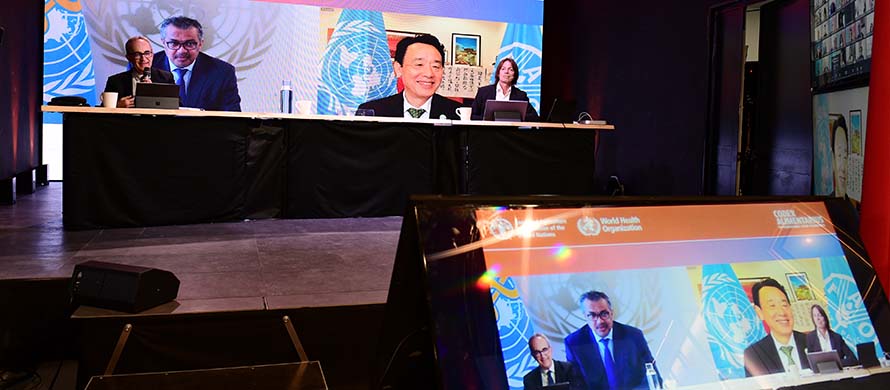
As a result of CAC44, a number of standards and related texts and changes in them were adopted for spices, for contamination in foods, for methods of analysis and sampling, for food additives, food labelling, contain foodborne antimicrobial resistance, the use of electronic certificates, programs voluntary third-party assurance, MRLs for residues of veterinary drugs and pesticides in food and feed.
The delegates at the last session could not reach agreement on the issue of MRLs for zilpaterol, any of these proposed conclusions. CAC44 requested the Chairperson and Vice-Chairpersons of the Commission to undertake informal consultations with all relevant parties to encourage and enable sustained effort to build consensus in advance of CAC45.
The Reservations in Kazakhstan were taken, together with Egypt, the European Union, Norway, the Russian Federation, Sweden, Tunisia and Ukraine when adopting the MRL of halquinol in muscles, skin with fat, liver and kidneys of pork, due to the possible use of this antimicrobial agent as a growth promoter.
Also on the revised draft Code of Practice to Minimize and Contain Foodborne Antimicrobial Resistance (CXC 61- 2005), the European Union and its Member States, Colombia, Canada, Kazakhstan, Morocco and Norway have expressed a reservations on «therapeutic use» due to could favour the continued non-responsible use of medically important antimicrobial agents in animals, incl. to increase production volumes.
At CAC44, an election was held to elect the Chairman of CAC, which became Mr. Steve Werne (UK), and Vice Chairs of CAC: Mr Diego Varela (Chile); Mr. Allan Azegele (Kenya); Mr. Raj Rajasekar (New Zealand).
November, 19-25, 2021. The Codex Committee on Nutrition and Foods for Special Dietary Uses (CCNFSDU) held a virtual session for the first time. Preliminarily, under the chairmanship of Kazakhstan, a pre-session online meeting was held among country- members of the European region. The pre-session was attended by delegations from the EU, Portugal, Great Britain, North Macedonia, Switzerland, Hungary, Denmark, Sweden, Norway. Countries expressed their positions.
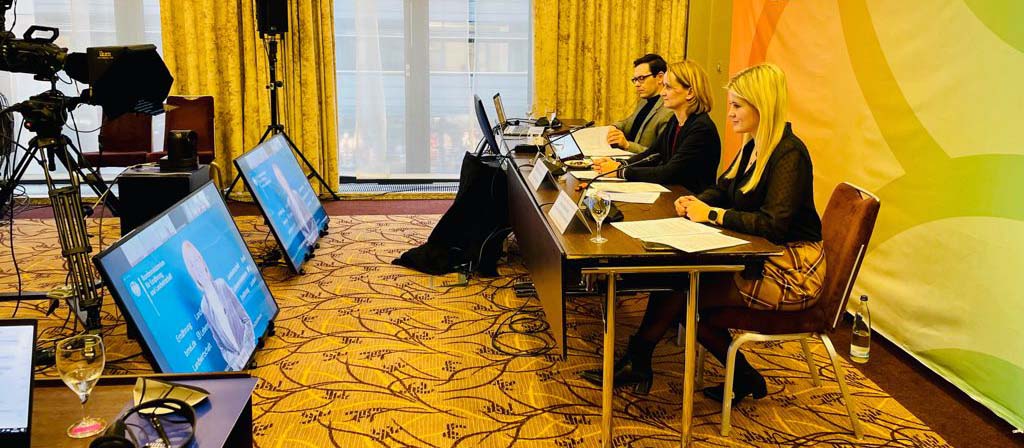 The Committee has submitted draft documents that have been discussed for several years and have no fundamental disagreements among the member countries of the Codex Alimentarius Commission:
The Committee has submitted draft documents that have been discussed for several years and have no fundamental disagreements among the member countries of the Codex Alimentarius Commission:
The decisions on the above documents are reflected in the report of the 42nd session of the Committee.
November 29 - December 3, 2021. The online training workshop "Better training for safer food" was organized by the European Commission jointly with Kazakhstan Codex team. Delegations from the European region countries such as Kazakhstan, the Kyrgyz Republic, North Macedonia, Slovenia, Armenia, the Republic of Moldova, Georgia, Serbia and others participated in the workshop. The workshop was opened with a welcoming speech by the Vice Minister of Healthcare of the Republic of Kazakhstan Kiyassov Y.A., the Head of the division of the European Commission Zoltan Somogiy. The lecturers were delivered by the national coordinators for the Codex (Germany, the Netherlands), as well as the Codex contact point for the Federal Republic of Germany, France. It is important that some of the lecturers work in the secretariat of the host country of the relevant subsidiary Codex committees participate in the work of the Codex Executive Committee and have extensive experience in Codex. Within 5 days, the lecturers made presentations and explained the nuances of the work, answered the questions of the participants. Also in the form of a game, a mock session of the Codex Committee on Chocolate and Chocolate Products has been carried out, the participants of the workshop presented countries positions in frame the specific assigned goals.
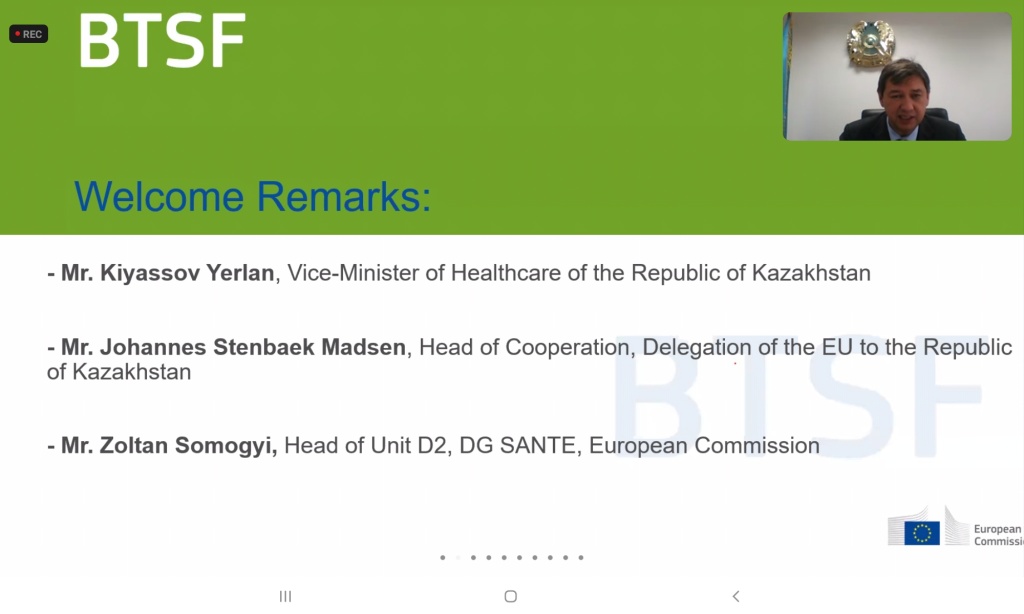
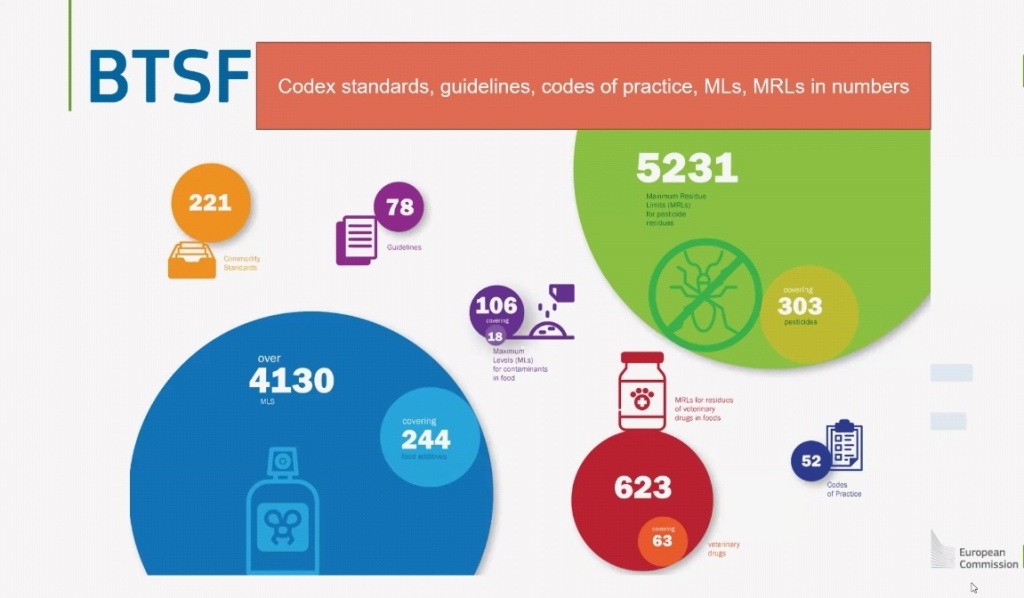
The 81st session of the Executive Committee of the Codex Alimentarius Commission began its work from October 28 to November 5 this year.
Welcoming participants to the 81st session of the Executive Committee of the Codex Alimentarius Commission, Naoko Yamamoto, Assistant Director-General WHO, said the past year has shown the critical place and role of food safety and healthy diets in the development agenda, as well as the important results that can be achieved together and in partnership. “Regarding Codex, you know very well the critical role of its standards and guidelines in ensuring safety and quality of food commodities to improve consumer health and nutritional well-being while protecting fair trade practices.”
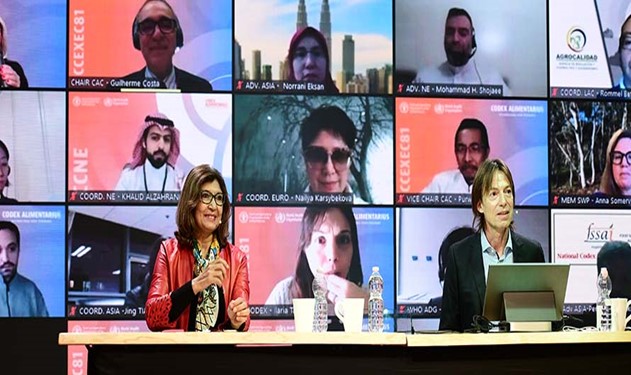
Guilherme Da Costa, Brazil, Chairperson of the Codex Alimentarius Commission drew attention to the incredible cooperation and partnership of the host countries he had witnessed throughout the pandemic, demonstrating their commitment to Codex. “Our community has shown itself to be a tremendous unit during this war the world has had to face,” he said.
The members of the executive committee represent 7 regions of the world, 6 coordinating committees of the Codex Alimentarius Commission.
The European Region was represented by the European Member Niklas Schulz (Germany), his advisers from the European Union and Finland, and the regional coordinator from Kazakhstan, Nailya Karsybekova.
The European team took an active part in the work of the Executive Committee, making significant amendments to the code documents on the growth hormone Zilpaterol hydrochloride under the CCRVDF, the Declaration of Principles, the reports of the regional coordinator for 2020-2021 and many others.
The Codex family has a responsible work ahead at the 44th session of the Codex Alimentarius.
November 4-5, 2021. An online seminar was held on the review of the institutional structure of the Codex Alimentarius for interested organizations of the Republic of Belarus.
Food Safety and Consumer Protection Officer Mary Kenny from FAO Regional Office for Europe and Central Asia and Chair of the FAO/WHO Coordinating Committee for Europe of the Codex Alimentarius Commission Nailya Karsybekova made a welcoming speech.
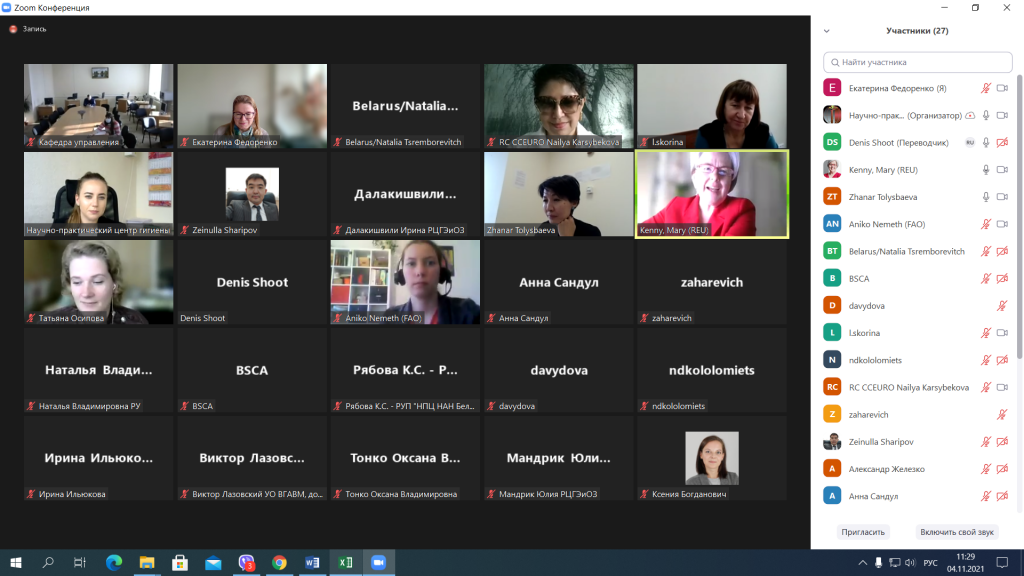
Employees of the national structure of the Codex Alimentarius of the Republic of Kazakhstan made reports covering such issues as studying the structure of the Codex Alimentarius Commission, its subsidiary bodies, classification of documents and steps for their development, familiarization with the main provisions of the Procedural Manual.
The participants in the seminar were represented by specialists from the Ministries of Health, Agriculture, the Scientific and Practical Center for Hygiene, specialized higher educational institutions, the State Committee for Standardization of the Republic of Belarus, the Republican Center for Hygiene, Epidemiology and Public Health, the State Food Industry Concern “Belgospischeprom” and others.
From 3 to 5 November 2021, the final online webinar this year has held as part of a series of regional training webinars on food safety based on risk assessment (GHP, GMP, HACCP) and Codex Alimentarius Standards.
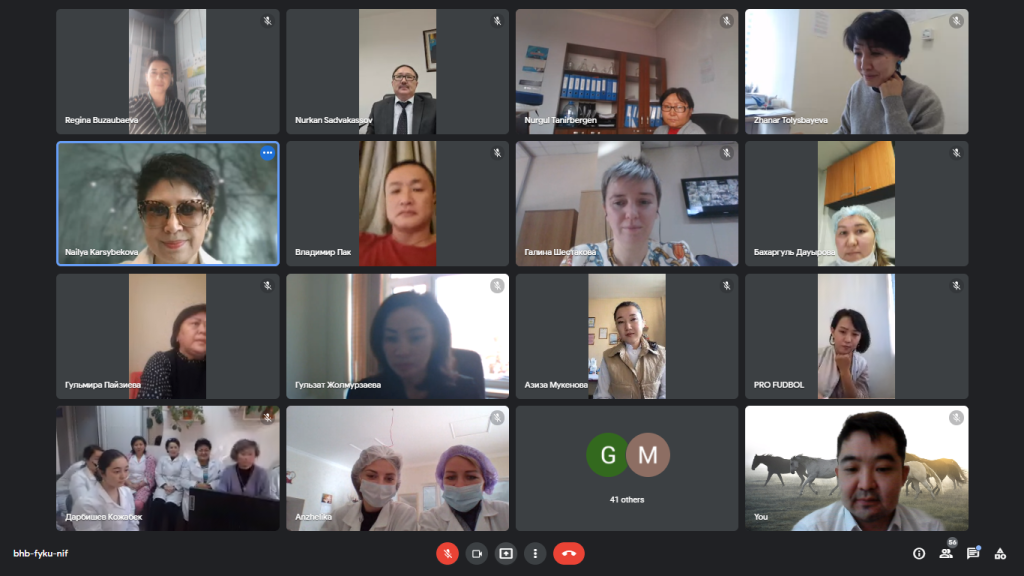
Webinar was arranged by the Committee of Sanitary and Epidemiological Control of the Ministry of Healthcare of the Republic of Kazakhstan jointly with the RSE on the REM «National Center of Expertise» of CSEC MH RK and the Codex Alimentarius Group of Kazakhstan for representatives of business communities of Almaty, Shymkent, The Almaty, Zhambyl and Turkestan oblasts, as well as the corresponding territorial subdivisions of the authorized bodies in the food safety and their subordinate organizations.
On the first day of the webinar, the Codex Alimentarius Group of Kazakhstan has presented the role of the Codex Alimentarius Commission, its subsidiary bodies and adopted international standards.
A consultant to the WHO Country Office spoke about the mechanisms for implementing “One Health” approach using the FAO and WHO food control assessment tools.
The rest of the days, the trainers of the National Center of Expertise presented to the participants of the webinar the bases of ensuring food safety on food production by implementing the HACCP system and good hygienic practices GHP and GMP.
November 1, 2021, the Deputy Committee for Sanitary and Epidemiological Control of the Ministry of Health of the Republic of Kazakhstan, Sadvakasov N.O., as well as the Codex Alimentarius Group (hereinafter referred to as the GCA) took part in a working meeting with an officer on food safety of the WHO Regional Office for Central Asia, Peter Hojeskov.
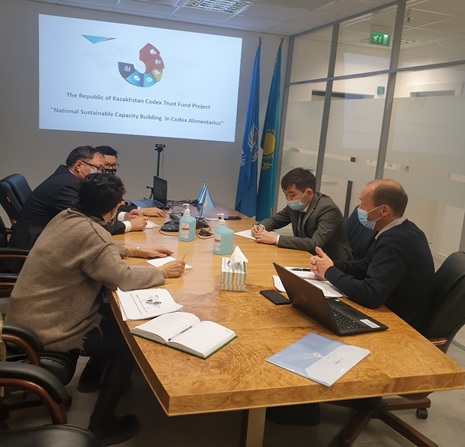
The Regional Coordinator of the FAO / WHO Coordinating Committee for Europe of the Codex Alimentarius Commission Karsybekova N.M. submitted a presentation on the implementation of activities under the FAO / WHO Trust Fund project for 2021. The main results of the events, preparation of the 32d session of the FAO / WHO Coordinating Committee for Europe of the Codex Alimentarius Commission have been discussed.
WHO officer Peter Hojeskov noted positive progress in promoting the project.
N.O.Sadvakasov mentioned the problems in the financing of the GCA for 2022-2023. At the same time, the CSEC of the Ministry of Health of the Republic of Kazakhstan does not intend to slow down the pace of work on the Alimentarius Codex in the country.
Regional WHO officer Peter Hojeskov promised to assist in writing an official letter to the Government of the Republic of Kazakhstan to provide support on Codex Alimentarius issues in Kazakhstan.
The 8th Session of the Ad hoc Codex Intergovernmental Task Force on Antimicrobial Resistance was held virtually from 4-9 and 13 October 2021, with adoption of the report on Saturday 16 October 2021.
Kazakhstan, as the Regional Coordinator of the Codex Coordinating Committee for Europe, held a preliminary online session with the member countries of the Codex Coordination Committee for Europe on 30 September 2021.
The main documents of the preliminary session and TFAMR08 were
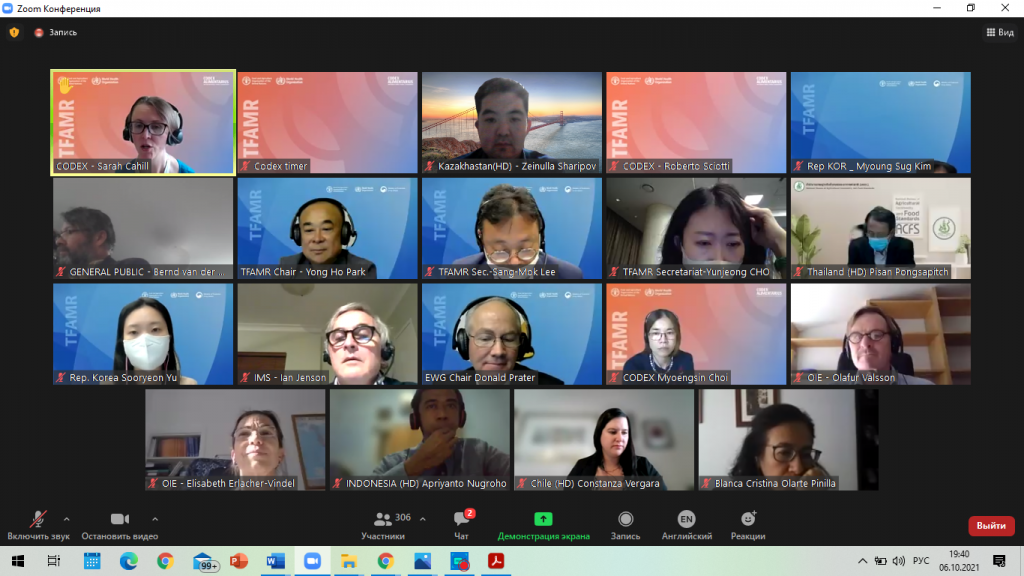
The main issue that caused heated discussion was the therapeutic use, which included, along with traditional treatment, also the prophylactic use of antimicrobial agents.
At the preliminary online session, participants decided to develop a draft common document on antimicrobial resistance from all members of the European Region.
The TFAMR08 noted the urgency of the issue of antimicrobial resistance as it is rapidly spreads across the world and stressed the importance of reaching consensus on all issues.
The EU, the Russian Federation, Canada, Kazakhstan and others have taken reservations about the establishment in the definition of "therapeutic use" to refer to "some national laws or jurisdictions" as language contrary to the objectives of harmonization.
Following the results of the TFAMR08, it was decided to send the draft documents to the 44th meeting of the Codex Alimentarius Commission for the possibility of their adoption.
October 6-8, 2021, the Committee for Sanitary and Epidemiological Control of the Ministry of Healthcare of the Republic of Kazakhstan (CSEC MH RK), together with the National Center of Expertise of CSEC MH RK and Codex Alimentarius Team of Kazakhstan, organized and conducted an online training workshop "Ensuring food safety. International Standards Codex Alimentarius". The workshop was attended by territorial subdivisions of CSEC MH RK, CSI of the Ministry of Agriculture of the Republic of Kazakhstan (MA RK), CVCS of MA RK, branches of the National Center of Expertise and local food producers in Nur-Sultan, North Kazakhstan, Karaganda, Pavlodar, Akmola, Kostanay oblast.
Speakers spoke about food safety based on risk assessment (GHP, GMP, HACCP) and Codex Alimentarius Standards.

The first day of the seminar was devoted to international standards, where experts of the Codex Alimentarius Team of Kazakhstan presented materials on the role of the Codex Alimentarius Commission, stages of Codex standards development, country and regional nuances and peculiarities.
A consultant to the WHO Country Office spoke about the mechanisms for implementing “One Health” approach using the FAO and WHO food control assessment tools.
The rest of the days were devoted to the trainers of the National Center of Expertise, who laid out the basics of good hygienic practices GHP and GMP, ensuring food safety through the implementation of the HACCP system.
October 15, 2021. For the implementation of the Project “Building sustainable national capacity on Codex Alimentarius”, an online training was held to train national experts in the skills of working on various Codex platforms.
Welcoming remarks were made by the Chairperson of the FAO / WHO Coordinating Committee for Europe of the Codex Alimentarius Commission N. Karsybekova.
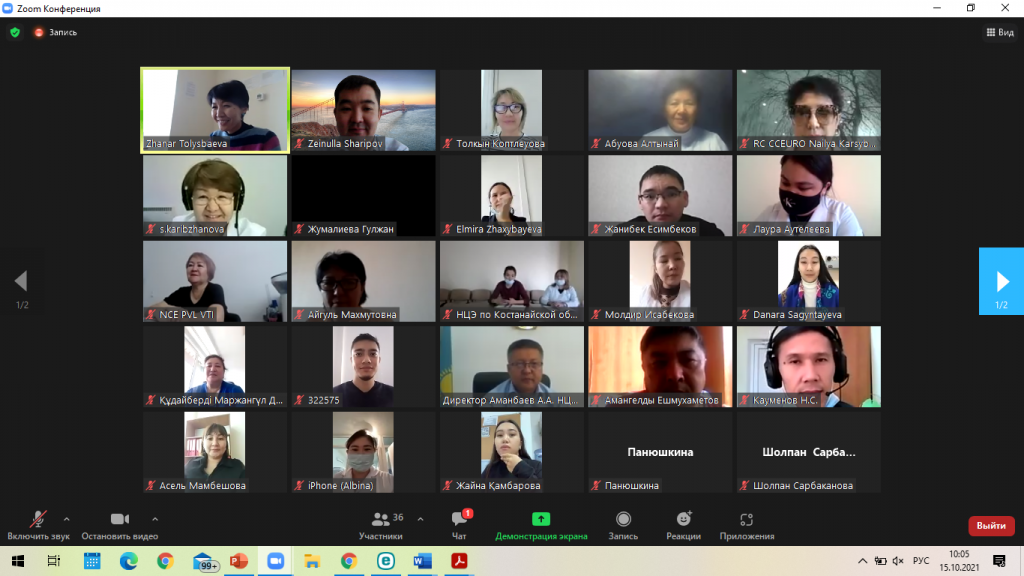
According to the program of the seminar, experts from the Codex Alimentarius Team gave general information about the platforms used by Codex and their meaning. The types of users are differentiated, the functionality of each and their measure of responsibility are defined on electronic platforms. This information is necessary for national experts to understand the work of electronic platforms, the goals of various Codex electronic tools to ensure the inclusiveness of national experts from the member countries of the Commission.
At the end of the seminar, the national experts were awarded participation certificates.
October, 7, 2021, the Codex Alimentarius Team organized an informal meeting for CCEURO members of CAC. The meeting was dedicated to the candidates for CAC vice-chairman (Dr. Allanom Azegele (CCAFRICA, Kenya), Mr. Diego Varela (CCLAC, Chile) and Mr. Raj Rajasekar (CCNASWP, New Zealand)).
The meeting was chaired by the Regional Coordinator of CCEURO Nailya Karsybekova.
Speeches of candidates on the mission and vision of the forthcoming work as CAC vice-chairman were heard in the following areas:
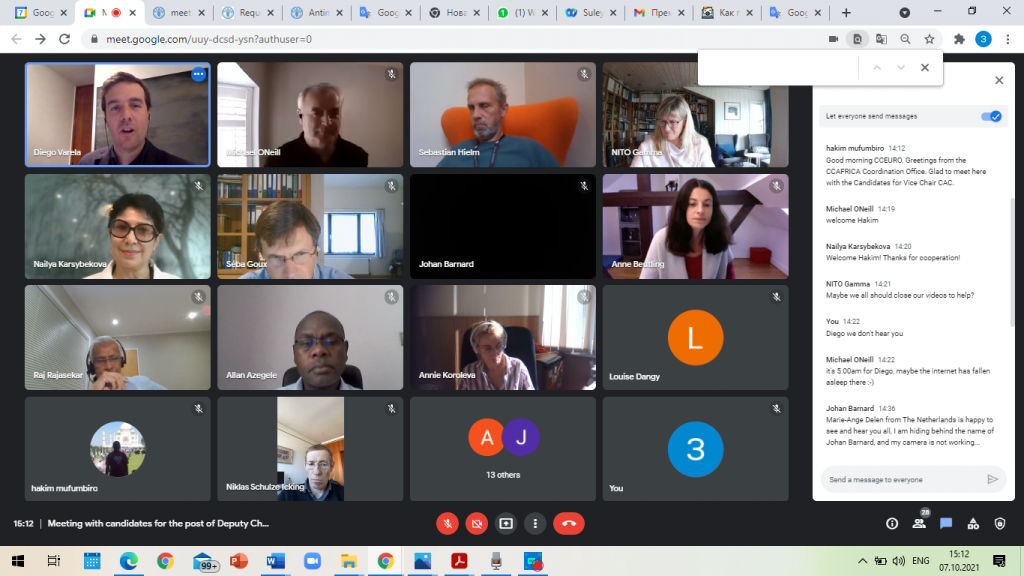
The meeting was attended by 43 member states, as well as the European Union. The participants of the meeting asked questions to which exhaustive answers were received from 3 candidates.
Regional coordinator Karsybekova N.M. wished to the candidates, on behalf of all members of the European Region, success in the upcoming elections at the 44th session of the CAC.
On September 24, 2021, an informal meeting of the European member countries and observer organizations of the Codex Alimentarius Commission was held with the participation of the Codex Secretariat, FAO, WHO Regional offices and Headquaters.
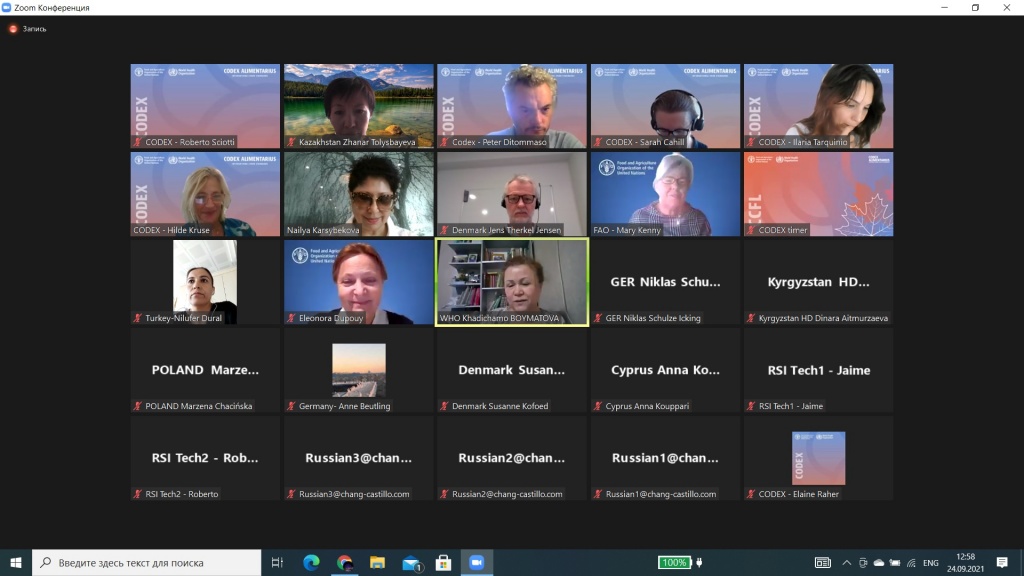
The issues of holding the virtual 44th session of the Commission, the possibility of holding CCEURO'32 in a hybrid format, the country's candidacy for the position of the next chairman of CCEURO were discussed at the meeting. A slido survey was conducted among participants about the possibility of participating in the work of the existing virtual Codex Committees, the format of the meetings, and other.
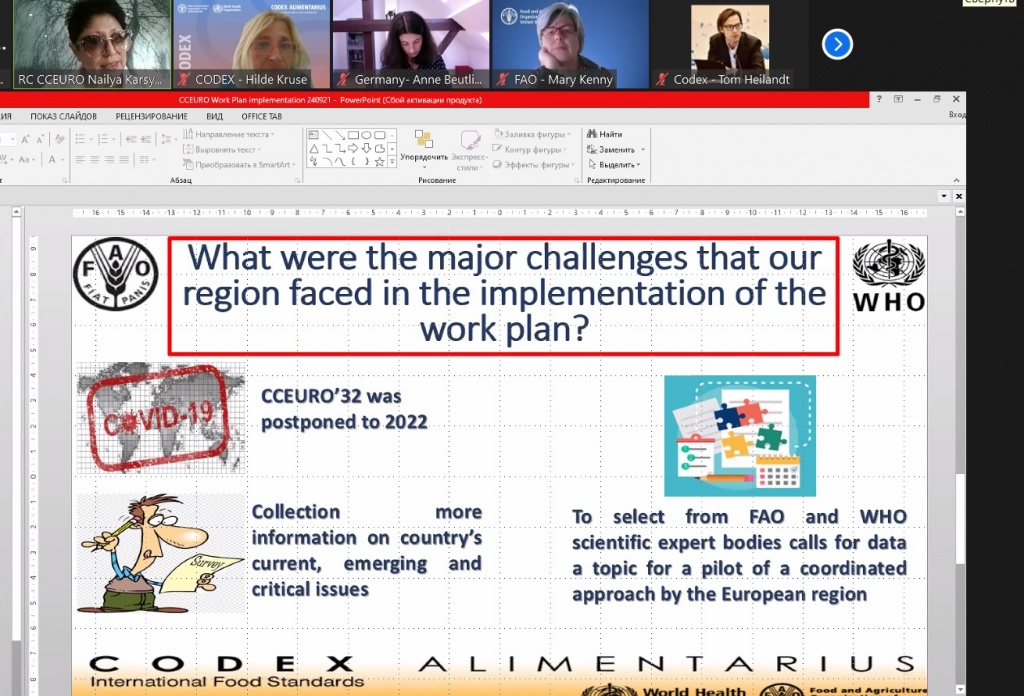
The Chairperson of the FAO / WHO Coordinating Committee for Europe of CAC Karsybekova N.M., representatives of the Codex Secretariat, candidate for the Chairperson of CAC Steve Wearne, as well as the Codex Contact Point of Germany Anna Beutling took part as the speakers. The speakers answered the questions of the participants, clarified on some positions, and shared opinions. The meeting was held in Russian and English.
52 -nd Session of the Committee on Pesticide Residues (CCPR52) was held in virtual mode from 26 to 30 July 2021. The session report was adopted on August 3, 2021.
Kazakhstan, as the Regional Coordinator of the Codex Coordinating Committee for Europe, held a preliminary session with the member countries of the Codex Coordination Committee for Europe on 23 July 2021. It was reported that the reassessment of toxicological properties and maximum residue levels (hereinafter - MRLs) of carbentase and thiophanate-methyl and other pesticides was continuing within the EU, taking into account the available information. A proposal was made to clarify the definitions of fat and meat when revising the classification of food and feed. It was also suggested that it should be further clarified that the bones should be removed before the analysis of MRLs, as the MRLs is set on boneless meat.
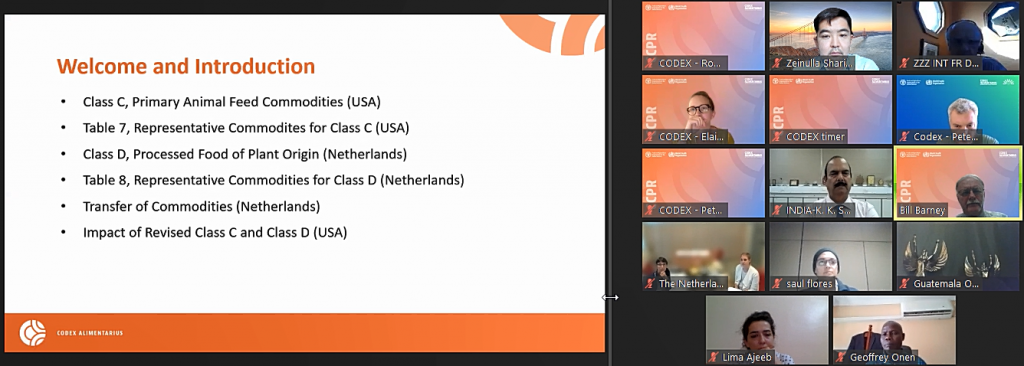
At CCPR52, a consensus was reached on the draft MRLs for 43 pesticides in food and feed, with 22 pesticides recommended to be revocation. Also at the meeting, revised classifications of products and feeds of class C "Primary animal feed commodities" and class D "Processed foods of plant origin" were discussed and approved for further approval.
In order to finalize the comments received and present the draft Discussion paper on the management of unsupported compounds without public health concern scheduled for periodic review at the 44th meeting of the Codex Alimentarius Commission a electronic working group was re-establish. It is also necessary to note some decisions taken to re-establish the electronic working groups for the elaboration of the following documents:
July 12, 2021. Kazakhstan held a preliminary session with the member countries of the Codex Coordination Committee for Europe (hereinafter - CCEURO) chaired by the expert on standardization in veterinary medicine Sharipov Z.F. This preliminary session was held in preparation for the forthcoming 25th session of the Codex Committee on Residues of Veterinary Drugs in Foods (hereinafter - CCRVDF25). The event was attended by 17 participants from eight countries, as well as the European Union. At the pre-session, there was a lively discussion on the issue of establishing a maximum residue limits (hereinafter – MRL) of zilpaterol hydrochloride for cattle (hereinafter - zilpaterol). This issue is a priority for the European region and was previously discussed at the 30th and 31st CCEURO sessions. As a result of the discussion, the participants agreed on maintaining the previous position against the use of growth promoters and the establishment MRL for such substances, which also include zilpaterol.

CCRVDF25 took place from 12 to 16 July 2021. The session report was adopted on July 20, 2021.
As a result of the discussions, the CCRVDF25 participants concluded that the current Code of Practice on good animal feeding (CXC 54-2004) provides sufficient guidance to deal with the unavoidable and unintended transfer of residual levels of veterinary drugs from feed to food.
Also at the meeting were agreed for further approval of MRLs for flumetrin in honey, diflubenzuron in salmon; halquinol in pork and ivermectin in sheep, pigs and goats.
No consensus could be reached on the establishment of the MRL for zilpaterol. Kazakhstan, acting as coordinator of CCEURO, indicated that this is a priority issue for their region and drew the attention of CCRVDF to the unanimous opinion of CCEURO members against the use of growth stimulants and establishment of MRL for such substances. This position was reflected in the CCRVDF25 report.
Further discussion of the MRLs for zilpaterol will take place in consultation with the Executive Committee and the Codex Alimentarius Commission.
June 17-18, 2021 The online workshop for national experts “Capacity building of national experts on the work of Codex Alimentarius. Building skills for working with Codex online tools”.
In the framework of the Codex Trust Fund Project implementation for the workshop as a mentor an WHO international consultant f Yeronimas Maskelyunas (Lithuania) has been invited, who has a great experience in Codex Secretariat for several years. On the first day of the workshop the participants got acquainted the structure, key working principles and significance of the Codex Alimentarius Commission in the world food trade, the work of the national Codex structure, and also discussed the bases of the Codex Committee electronic work and the online commenting system of documents. Assistance in conducting and training national experts was provided by the Codex Alimentarius Kazakhstan Group.
On the second day of training national experts worked in groups to comment on requests provided via Codex Secretariat circular letters. Reflections and arguments were formalized into a position on the issues in the documents presented.
The seminar was attended by experts of the National Center for Expertise, various research institutes, higher educational institutions, KazInSt and others.
By the end of the seminar, certificates of completion of the initial stage of the workshop and a group photo have been distibuted.
As the Vice Minister of Health care E. Kiyasov noted, food products consumed by the population determine the standard of living and well-being of future generations. WHO estimates that the consumption of food contaminated with bacteria, viruses or parasites, as well as toxic or chemical substances, causes 600 million cases of foodborne illness and 420,000 lethal cases each year.
A welcoming speech was made by the founder of the primary health care in the Republic of Kazakhstan, the organizer of the landmark Alma-Ata conference, at which the historic "Magna Carta of World Health" was adopted, the founder of nutritional science in Kazakhstan, Academician of the National Academy of Sciences of the Republic of Kazakhstan, Academician of the Russian Academy of Medical Sciences, Laureate of the Leon Bernard WHO Foundation for an outstanding contribution to development of world health care, President of the Kazakh Academy of Nutrition Toregeldy Sharmanov.
This year, World Food Safety Day is held under the motto "Food safety is everyone's business!". Food safety calls to action reach everyone in the food chain – “from farm to table”.
The value chain has become much more complex in the digital age, so any adverse food safety incidents can have negative consequences to public health, as well as trade, employment and the economy around the world. Therefore, the application of scientific principles and approaches plays a special role in food supply.
The Codex Alimentarius Commission was established under the auspices of FAO and WHO to address food safety concerns. The international standards and procedures developed by the Commission are the main yardstick of fair trade for the World Trade Organization. Kazakhstan has achieved recognition in this organization and for the second term is the coordinator for the European region, which has 52 members, including the European Union.
The round table meeting was attended by the representatives of international organizations WHO, FAO, OIE, government agencies, scientific organizations, unions and associations of producers and consumer protection of the Republic of Kazakhstan.
The resolution was adopted in the end of the round table, in which the participants recognized the particular importance of World Food Safety Day in global challenges, the importance of ensuring sustainable interaction in food safety among all stakeholders of the food system in order to protect consumer health and fair trade practices. In addition, they emphasized the need to introduce the best world practices to ensure food safety in Kazakhstan, the need to strengthen the role of education, science and risk assessment in ensuring the safety and quality of food products, the importance of raising consumer awareness of their rights to safe and high-quality food products.
May, 18, 2021 the International Union of Non-Governmental organizations “Eurasian Peoples’ Assembly” held the Independent Dialogue “Different Routes – Similar Goals” in support of the Food Systems Summit 2021. Independent dialogue is an integral part of the events of the Global Food Forum – 2021, which develops the theme of the Summit.
In November 2021, at the initiative of the UN Secretary General, the 2021 Food Systems Summit will take place to call for bold new actions to change the way the world produces and consumes food , reduce diet-related diseases, make the planet healthier and make progress in the implementation of all 17 Sustainable Development Goals (hereinafter- SDG).
Government officials, scientists, international organizations, non-governmental organizations of the Russian Federation, the Republic of Kazakhstan, the Republic of Belarus, Vietnam, representatives of the African continent, the United States took part in this independent dialogue.
Regional Coordinator for Europe Karsybekova Nailya made a presentation on “The Role of the Codex Alimentarius and Food Safety at the 2021 Food Systems Summit”. The relevance of codex standards for building sustainable food systems is presented, implementation of the SDGs within the Strategic Plan 2020-2025.